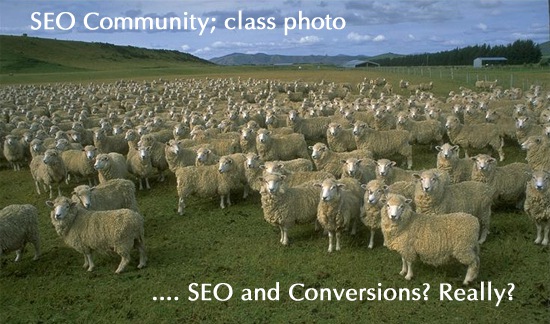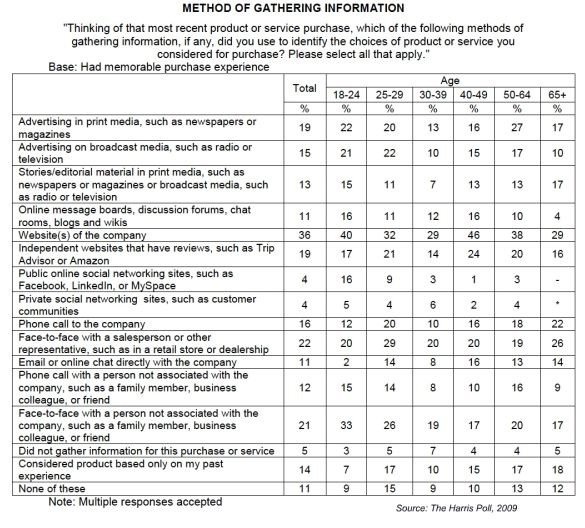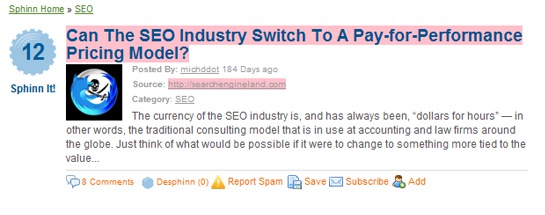Seems I am still running into SEOs that believe, however misguided, that conversions are somehow their domain. This seems speak to the fact that many search optimizers may not have a grip on the marketing model. While I’m not as well versed as I once was, let’s at least take a stab at this…
For starters there are simply too many potential factors out of the average SEOs control that can affect the over-all conversion rate on a given website/page. I know this is unlikely a popular view, but hear me out for a few moments.

Factors affecting conversion rates
The first thing to consider is the actual elements that affect conversions. So let’s review a few of them shall we? Here are a few elements which can affect conversion rates;
- Product/Service offering; right off the bat product/service choice and ultimately pricing will play into conversion rates.
- Website infrastructure; a website that is not intuitive and user friendly will undoubtedly have more sales friction (abandoned carts, missed lead capture).
- Page Copy; professionalism, unique selling proposition and call to action. Obviously an important consideration in the process. Developing buyer motivation and the moving the buying cycle is massive.
- Incentives; other products or value-adds for the core offering. Many times one has to offer added value to further cement the final sale ( or upsell/downsell etc..).
- Continuous improvement process; ongoing A/B, MVT testing and tweaking. This type of page optimization is not traditionally the domain of SEOs.
- Customer Service; oddly this can have an affect if people are engaging in WOM and thus visitors (even if only doing a navigational brand search) are somewhat pre-qualified when entering the site. Even past (happy) customers will use a navigational search to go back to the site many times.
And that doesn’t even cover all the elements of the consumer purchasing decision process. What I hope it does do, is give you an idea of the myriad of elements that come into play when one is talking conversions. If you advocate a ‘pay for performance’ model for SEO, then do so at your own risk. Here’s an interesting bit of research to give you further insight;

What DO we do?
Most certainly SEO and conversions are related and can play together. As SEOs we need to understand them and tailor targeting strategies accordingly. But our job is to bring ‘targeted’ traffic. This is not the same as being involved in the conversion optimization process. I don’t believe the average SEO should be fooled into believing otherwise.
And so what is it that the average SEO does that plays into the conversions realm? A few that I can think of include;
- Keyword targeting – obviously one needs a solid KW research program to ensure you are going after the appropriate query spaces for the best possible potential. Ranking for terms that are poorly targeted can obviously bring consumers with a low threshold of converting.
- Rankings – being above the fold is certainly going to improve the SERP CTR. This will bring greater amounts of targeted traffic. To that end, this IS an area where SEOs can affect the over-all program and conversions.
- Page TITLE – not only does this come into play as far as ranking signals are concerned, but it can also be an important aspect of the SERP click-through rates once you’ve made it to page 1.
- Meta-Description/Snippet – also related to the above, though not generally an important ranking factor, a well crafted snippet can play into SERP conversions… (though the engines can also choose page text)
- Link building – if we want to be ranking for the target terms, in most cases some tightly targeted links will be needed to gain placements most likely to produce the most targeted traffic.
And really, that is about it. Sure, there are many of us that work with actual page content and even call-to-action etc… but that’s no longer SEO now is it? It is a cross-over.
The actual process of SEO doesn’t really touch on the many elements (we’ve outline) that affect conversions. Yes, we are a link in the chain, but we’re not by any means dealing with ALL the areas that come into play.

Don’t shoot the messenger
The next time you hear an SEO talk about conversions or even worse, pay-for-performance, you’d do well to stop and consider this advice. Not only are there some inherent risks in thinking this way, there is a fair bit of naivety as well (not to mention insulting to the entire conversion optimization industry).
Search optimizers rarely have the control over the many elements that often accompany conversions. By trying to make conversions the domain of the SEO, we’re essentially showing our ignorance of the sales process and glorifying ourselves.
If you’re going to work for a percentage of sales and other forms of pay for performance, you’d better make sure that;
- You have enough control (beyond SEO) to actually affect conversions
- You have the knowledge (or partners) required to work in these other areas
Because if you don’t – I can assure you it will end badly. And really, once you’ve reached that level; why not just start your own web property? You have graduated and it’s time to move on… :0)
Anyway, I’ve stewed about writing this for more than a year, I am certain it won’t necessarily be a popular view, but it is a reality worth discussing. Also, this doesn’t mean people shouldn’t learn more about factors affecting a conversion rate, that’s also a smart move. But we should understand the domain of pure SEO and where it fits into the marketing mix…m’kay?
Until next time – play safe



